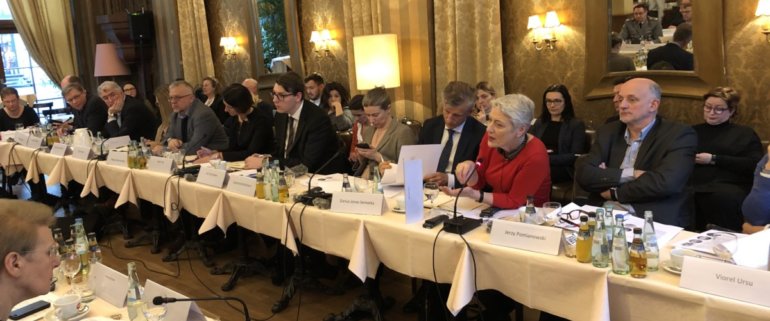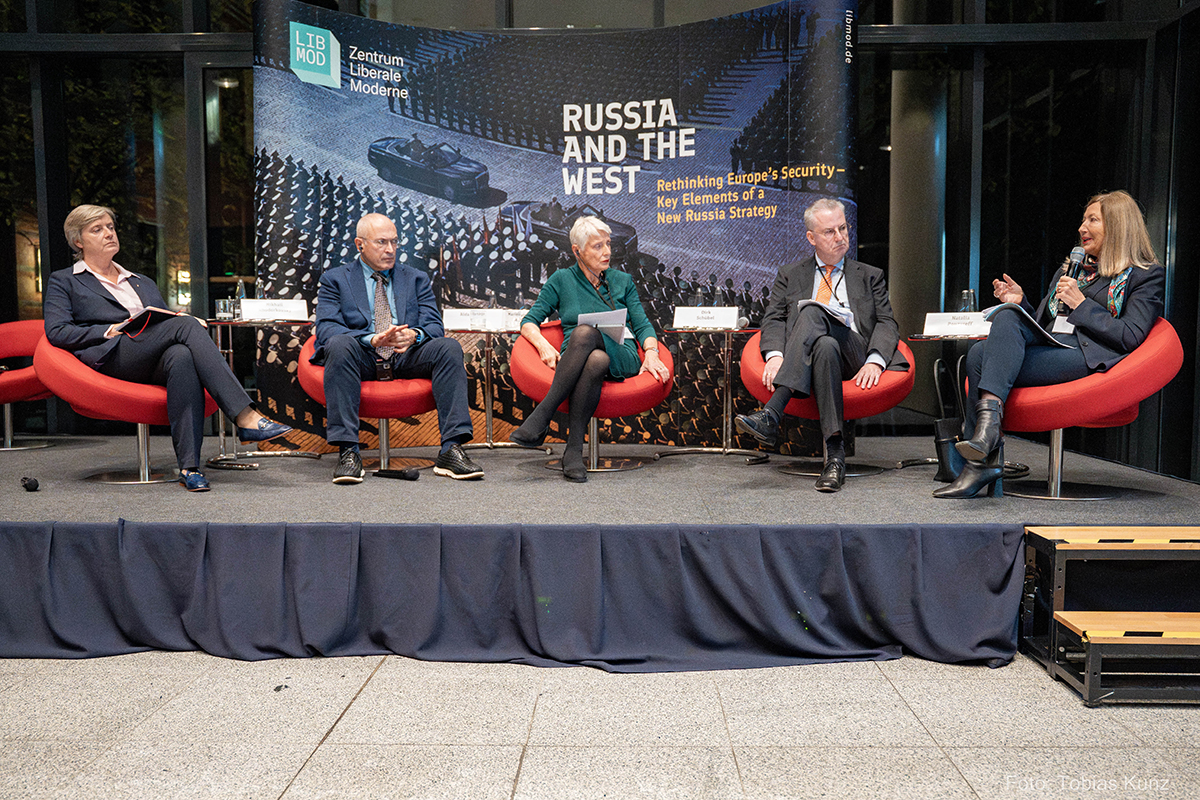Russia and the West – Do We Need a New Ostpolitik?

On January 17 the Centre for Liberal Modernity held its second international Russia conference. This year’s topic was if Germany’s policy of detente of the 1970s can offer any guidance for the right Western policy versus Moscow.
Ostpolitik is one of the few German words that have made it into English and other European languages. It is also one of the few strategic initiatives of German foreign policy in the decades following World War II. Ostpolitik is inseparably linked to the charismatic personality of Willy Brandt, who was Chancellor of West Germany between 1969 and 1974 (having served as Foreign Minister from 1966 to 1969).
The term resurfaced last summer, when German’s Foreign Minister Heiko Maas, a Social Democrat, began advocating a new European Ostpolitik. According to Maas, the “dangerous lack of communication between Washington and Moscow” makes it necessary to open new paths of cooperation with Russia in the interest with all European countries.
But does the impact of the 1970s Ostpolitik justify its resurrection? Is a new Ostpolitik the right answer to the challenges that emanate from Vladimir Putin’s Russia? This was the topic for intense and at times controversial debate at the conference “Russia and the West – do we need a new Ostpolitik?” held by the Center for Liberal Modernity in Berlin. It was the second in an annual series of conferences, that aims to bring together Russia-watchers and experts from all over the world.
The short answer is that it depends. Practically all of the more than 80 participants from Russia, Europe and the US agreed that re-upping German foreign policy of the 1970s is neither desirable nor adequate. The world and Europe have simply changed too much. But opinions differ over what exactly should constitute a new Ostpolitik — and if the term is fitting at all.
Willy Brandt’s Ostpolitik was aimed at reducing tensions, to overcome the partition of Germany and to find a lasting peaceful order for Europe. It led to the Helsinki Final Act of 1975, whose “three baskets” survive as the three dimensions of the Organization for Security and Co-operation in Europe (OSCE) – politico-military, economic-environmental and the “human dimension”, which includes human rights. It is important to remember the rules-based character of Ostpolitik, even though its original idea of “change through rapprochement” eroded over time, leaving lots of rapprochement and little change. The “Big Bang” of 1989 — the fall of the wall and the implosion of the Soviet empire — was much less a result of detente policy but of the democratic revolt in Central-Eastern Europe. It came unexpected and even against the status-quo-oriented thinking of West Germany’s political elites.
No man ever steps in the same river twice
The differences between the 1970s and today are a no-brainer. Germany is united, the former Soviet satellite states have joined NATO and the EU. A German “special relationship” with Russia, a regular demand from those on the left and the far right, would be a fatal signal to Germany’s allies. And, as participating historians pointed out, Brandt’s Ostpolitik was by no means isolationist but firmly based on Germany’s military and political membership in the Western alliance. Political dialogue and military deterrence were both part of it. NATO allies agreed at the time that it was necessary to talk with Moscow in order to achieve peace in Europe. Changing the status quo seemed possible only with and not against the Soviet Union. After all, the Prague Spring of 1968 and previous uprisings in Hungary 1956 and in east Germany in 1953 served as evidence that Moscow was ready to use force in order defend its sphere of influence in Europe.
This is a strong parallel with the crisis about Ukraine, which is basically about the foreign policy alignment of Europe’s biggest country by territory. A popular thesis at the conference was that Putin would support a new Ostpolitik because he likes spheres of influence. Accordingly, participants condemned a fresh division of Europe as a historic setback to the times before 1989. A new Ostpolitik would be immoral, one Russian participant said.
What sort of a country is Russia?
Moreover, Putin is not Brezhnev and Russia is not the Soviet Union – this was one of the conference’s recurring themes. Compared to Putin, Brezhnev was relatively predictable, more interested in stability and less interested in personal enrichment. By contrast, Putin’s elites possess a high degree of ideological flexibility and make political decisions with their personal fortunes in mind.
Others presented the thesis that the foreign policy agenda of Putin and his inner circle aims to restore Russian great power status and regain as much of the Soviet empire as possible. Ukraine plays a key role for these people’s hold to power and for their imperial ambitions.
Thus, while the Moscow elites of today are more reckless than their Communist predecessors, their country lacks the weight wielded by Soviet leaders. While Russia is a nuclear great power and has a standing army of more than one million men, it is just a middle power in economic terms. In 2017, its annual GDP of 1.5 trillion US dollars was less than half of Germany’s (3.68 trillion) and just one eighth of China’s (12 trillion).
Last but not least, the Kremlin elites are entangled with the West much more than Soviet leaders were. They need Europe as a place to safely park their assets, as a market for natural resources, as a source for high technologies and as a playground for Russia’s “golden youth”. Hundreds of thousands of Russian citizens already live in Europe permanently or temporarily and their number is growing every year. While going to lengths in destabilizing European democracy, Putin also needs the economic ties with Europe to keep his regime in power.
Be more assertive!
Despite all this, the EU shows few signs of an assertive policy versus Moscow. Especially in Germany there is a tendency to believe that Russia has more leverage and to overestimate the strength of Putin’s regime. Accordingly, many participants found it hard to identify western successes vis-à-vis Russia. Most agreed that Chancellor Angela Merkel has managed against many odds to keep in place the EU sanctions, which were imposed after the annexation of Crimea and the invasion of eastern Ukraine in 2014.
However, the effectiveness of the measures has been receding since 2016, when the Russian economy returned to albeit moderate growth. Many participants warned that the EU consensus for the sanctions is fragile, not least thanks to Putin’s allies in Europe, who can be found in every member state and have even joined some governments, like in Italy and Austria.
In this respect, 2018 was an annus mirabilis for Putin – an exceptionally lucky year. Not only did he win the managed election for his fourth term, he might also be happy about gains for right-wing populist parties across Europe. Italy’s Lega, Hungary’s Fidesz and the Sweden Democrats all made significant gains in parliamentary elections last year.
Transatlantic turbulences
Pessimism was especially pronounced with regard to the role of the United States. While Washington recently increased its sanctions against Russia, it did so without coordinating with Brussels. The threat of sanctions against Nord Stream 2 carries the risk of fresh conflict between the US and Germany. Practically all conference participants criticized the planned gas pipeline through the Baltic Sea – because it divides the EU, makes Ukraine lose billions in transit revenue every year, making the country even more vulnerable than before. While the US criticism is principally justified, both Washington’s and Berlin’s unilateralism was seen as counterproductive.
Moreover, recent talk about the US possibility of the US leaving NATO highlighted the growing mistrust of the Trump administration. What would be a strategic disaster for Europe would be a dream come true for Putin – the end of the transatlantic alliance.
Nobody is making predictions about a strategic-level US-European cooperation versus Russia, not least because President Trump is likely to remain embroiled in the Russia affair. “Expect more chaos, investigations and subpoenas from Washington,” said one prominent US participant.
Under these circumstances it is likely that the Kremlin is going to lay its eyes on a divided Europe: “Putin is not a chess player but a judo fighter. In order to be successful, a judo fighter must anticipate his opponents’ actions, make a decisive, preemptive move and try to disable him”, a Russian participant warned.
No German special relationship but a common European policy
Despite all this, there are some hopeful signs, too. Recent elections and opinion polls suggest, that the Putin consensus is weakening. In the regional elections in autumn 2018, four Kremlin candidates failed to win gubernatorial seats. And pollsters detect waning support for the expensive expansive foreign policy. At the same time, there are growing grass root protests against social grievances and ecological ills, something that conference participants interpreted as confirmation that Russian civil society is alive and well.
Other studies speak of changing values. Despite the propaganda of Russia’s own way, a majority of young people – mainly in large cities — see themselves as Europeans and seek a modern way of life. Generational change in business and politics opens new chances for rapprochement between Russia and the West. This is why everything should be done to support the development of a democratic civil society in Russia.
One tool suggested at the conference would be an EU-funded Russian-language TV channel that offers an alternative to Kremlin propaganda.
However, no one at the conference was ready to predict an imminent end of the “Putin System”.
Which is another reason to campaign for a common European policy. Because the EU’s chances to be a strong counterweight to Moscow are actually not that bad. More than 500 million citizens (446 million after Britian exits the bloc) who enjoy adequate economic growth are a force that no one should underestimate. If they speak with one voice, as a German foreign policy veteran stressed at the conference.
A good task for the German government and German foreign policy, according to a participant from Poland. Germany’s mission is not to build a special relationship with Russia but to hold Europe together and to enable it to become a player in global politics, he said.
The conference was held under Chatham House Rules, meaning that quotes are not attributed in order to enable a freer debate.
![]()
Hat Ihnen unser Beitrag gefallen? Dann spenden Sie doch einfach und bequem über unser Spendentool. Sie unterstützen damit die publizistische Arbeit von LibMod.
Wir sind als gemeinnützig anerkannt, entsprechend sind Spenden steuerlich absetzbar. Für eine Spendenbescheinigung (nötig bei einem Betrag über 200 EUR), senden Sie Ihre Adressdaten bitte an finanzen@libmod.de
Verwandte Themen
Newsletter bestellen
Mit dem LibMod-Newsletter erhalten Sie regelmäßig Neuigkeiten zu unseren Themen in Ihr Postfach.





